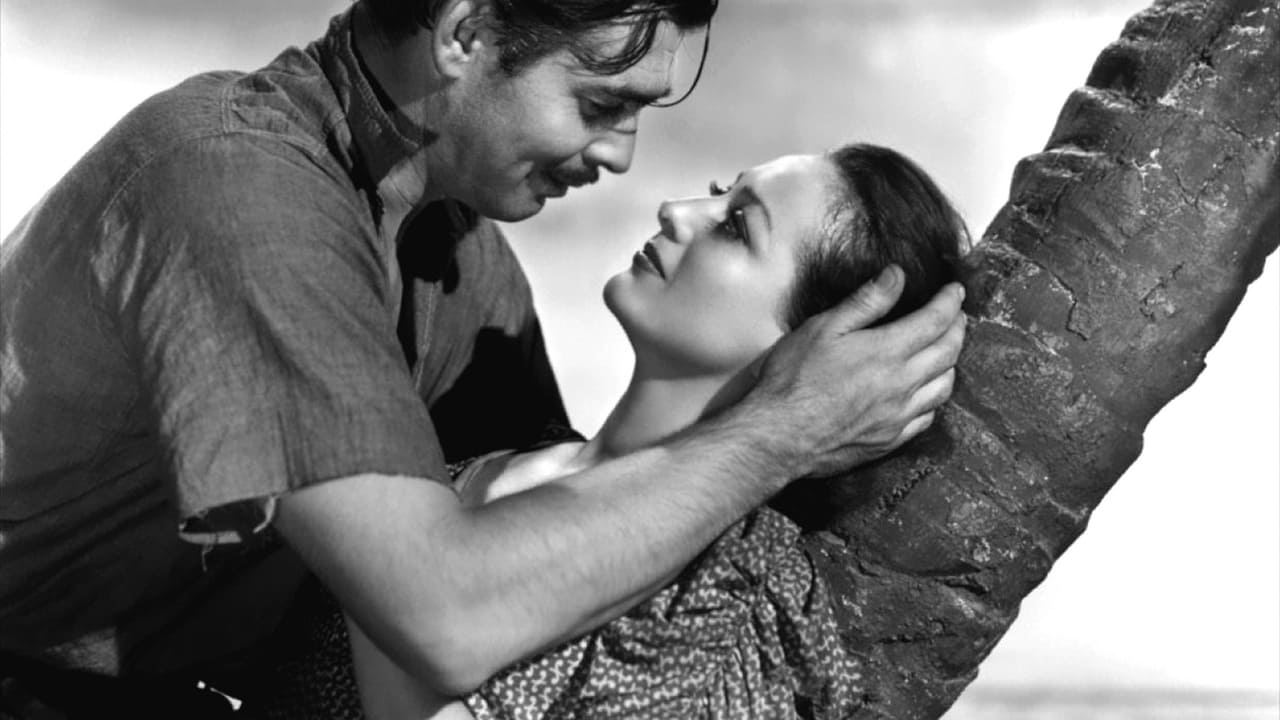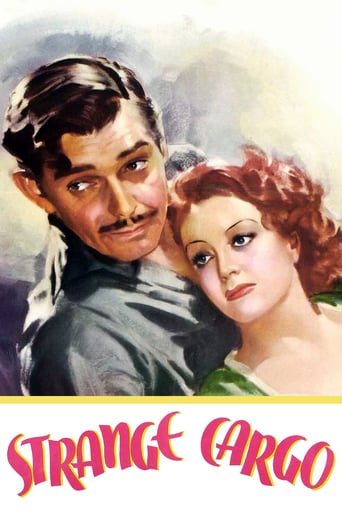

Clark Gable (Verne) is a prisoner on Devil's Island who has a track record for making escapes. And getting caught. Joan Crawford (Julie) is a singer in a bar on the Island. We are not told why she has ended up here but we can guess that she has had a wicked past. When Gable is found in her room she is expelled from the island and told to leave by the same way that she entered, meaning illegally through the jungle. She becomes a fugitive along with Gable and a handful of other prisoners as they make an escape attempt. Meanwhile the Prison Commandant Frederick Worlock (Grideau) awaits them at the port on the mainland that they are heading to, along with slimy Peter Lorre (Pig) whose ulterior motive involves shacking up with an uninterested Crawford.It's an interesting film that concentrates on a set of prisoners whose strange cargo comes in the form of prisoner Ian Hunter (Cambreau). He is the all-knowing morality man who allows each prisoner to look at themselves and make their peace before heading to their destinies. He appears from nowhere and has a Christ-like drowning scene at the end of the film where he hangs on to a cross in stormy waters.At work, we used to have a post messenger called 'Verne' who delivered files to our desks twice a day. He used to turn up on our floor and throw them at you, believing that was an acceptable way to carry out his duty. He'd just fling them at you and if they missed or hit the floor, so be it. Well, the way that Gable's portrayal of his character 'Verne' delivers his dialogue is just as brash. He just throws it at you. I didn't find him particularly likable. Gable plays it very macho and spouts a lot of dialogue with the use of the word "baby" stuck on at the end when he addresses Crawford. Crawford wins the acting award as she provides her character with some depth and you do wonder as to why she has ended up on the island. There seems to be more to her character, whereas Gable is just a meat-head. He has a rivalry with Albert Dekker (Moll) for leadership of the escaping group – guess who wins? Unfortunately, Dekker ruins his role by attempting an English accent from nowhere. No-one English speaks like that, Dekker! I think he was trying cockney? For me, the most memorable scene was when murderer Paul Lukas (Hessler) realizes his destiny. I think the film could have been better if it had concentrated on his character and his unwillingness to play by Hunter's rules. As it is, we get a love story playing against this conflict of good versus bad. It makes for a happy Hollywood ending with a morality message, but you've got to give full marks to Lukas. Hunter is just not relevant. Another good scene occurs on a boat to the mainland when Gable has to try the infected water. I would have just refused as it means certain death. How will he get out of that one? Perhaps he'll just keep shouting dialogue in a cocky manner, as he does in a climatic scene with Ian Hunter during a storm. Terrible acting from Gable.Overall, I liked this film as it gives a twist to the story of escaped convicts by throwing in a religious redemption element in the form of Hunter. But, it's a shame we didn't concentrate more on the story of Lukas. At the end, you can decide who really wins. Not many are left with their freedom.
... View MoreStrange Cargo (1940)*** (out of 4)Bizarre and flawed film from MGM about a group of men who escape from Devil's Island but fall under the spell of a man who appears to be Christ. This film turned out to be the last between stars Joan Crawford and Clark Gable and the studio certainly picked out a strange one for them. He plays one of the convicts who escapes, she's the woman who gets dragged along and Ian Hunter plays the Christ like character who tries to teach all these bad people the right way to do things. The "strange" in the title is certainly fitting as throughout the film I couldn't help but wonder why this film would be made and released when it was. I mean, a lot of religious things were in movies at this time but I'm not sure why the studio needed something so heavy. The film starts off pretty strong as it's basically a prison escape movie with a lot of adventure thrown in. The escape sequences through the jungle were quite thrilling and it made for a fun time. Even before this we're given some situations and dialogue between Gable and Crawford that were a little bit daring and especially considering this was made long after the pre-code era. The way Gable forces himself on Crawford is just something that wasn't the norm. Once everyone gets to the boat and gets on the ocean is when the religious stuff really starts to take center stage and lets just say that it's very much in your face. The final twenty-minutes are without question the weakest and I think the film really loses its way and becomes way too preachy. At 114-minutes the film eventually just runs out of gas. However, before that happens, the film is good enough to watch thanks in large part to the terrific cast. Gable is as good as always. Crawford makes for a great love interest. Hunter appears to be having fun with his lines and we also get good support from Peter Lorre, Albert Dekker and Paul Lukas. STRANGE CARGO has many flaws but fans of the cast should enjoy it.
... View MoreSTRANGE CARGO (Metro-Goldwyn-Mayer, 1940), directed by Frank Borzage, teams the romantic pair of Joan Crawford and Clark Gable for the eighth and final time. For their last union together, it became not only one of their finer performances, but an opportunity for something completely different. Gable, who retains his he-man disposition, appears sweaty and unshaven much of the time while Crawford, the tough girl reminiscent to her Sadie Thompson portrayal from RAIN (United Artists, 1932), abandons her glamorous style for second hand dresses to wearing little to no make-up whatsoever, adding touches of realism to their characters. Based on the story, "Not Too Narrow, Not Too Deep" by Richard Sale, the opening title, which reads, "Deep in the Culands ... a penal colony for men set aside to the forgotten by the world they live in ... for men to whom the present, the future and the past are one ... for men without hope," offers some indication to what's to be presented on screen.The plot revolves around a tough but likable convict named Andre Verne (Clark Gable), a thief by profession with three more years on his prison term. Coming out of his thirty days in solitary confinement, he's given the opportunity to work outside the prison walls by Griderv (Frederick Worlock), a good-natured warden. While on wharf duty on the pear near a French colony, Verne encounters Julie (Joan Crawford), a tough girl accompanied by Suzanne (played by uncredited Betty Compson). Having met his match, Verne breaks away from his returning line of 36 convicts to keep his "appointment" with Julie at Renard's Cafe where she works, while Cambreau (Ian Hunter), a mysterious figure who comes out of nowhere, steps in for the missing Verne. M'Sieu Pig (Peter Lorre), a "dirty rotten stool pigeon" with a passion for Julie who despises him, notifies the authorities after witnessing Verne sneaking into her dressing room from the outside window. After Verne makes a pass on her, Julie breaks away and turns him over to the law. Losing her job for harboring a wanted fugitive, Julie is given 12 hours to leave the colony. Back in prison, Verne assumes partnership with Moll (Albert Dekker), his arch rival, planning a carefully planned escape through the jungle leading them towards a boat that awaits him. To accompany him are fellow prisoners: Telez (Eduardo Cianelli), a religious fanatic; Hessler (Paul Lukas), a killer; DuFond (John Arledge), a former medical student; Flaubert (J. Edward Bromberg), a coward, and the mysterious Christ-like figure, Cambreau. Verne, who has picked up Julie along the way, comes along for the ride on the boat. While drifting along for days in the hot sun with no food and water, they all find themselves facing uncertainties ahead, their destinies known only by Cambreau.What makes STRANGE CARGO so fascinating is how the premise somewhat pre-dates the 1977 comedy, OH, GOD, starring George Burns in the title role. STRANGE CARGO might have been just another prison break related theme had it not been for a religious angle added to it. Had it not been regarded controversial, reportedly being given a "C" rating for condemned by the censors at the time of its release, Ian Hunter, in possibly the most significant role in his entire career as "the man who played God," might have been awarded an Academy Award nomination as best supporting actor. Interestingly, for a performance that nearly outshines the leading players of Crawford and Gable, whose chemistry is still strong since their initial union on screen in 1931, this might have paved the way for Hunter in leading roles, but regardless of his long resume as a movie actor, he hardly achieved any such stature.Also noteworthy is Albert Dekker, sporting a British accent (isn't he supposed to be French?), who makes a fine leader of the pack and threat to Gable's character. Their differences are brought out on the beach where two toughs fight it out. As for Peter Lorre playing the informer whom Juliue "could never get low enough to touch," is given little to do and plenty of time to do it.At 114 minutes, STRANGE CARGO tends to drag with some drawn-out sequences and limited underscoring, but film overall tends to be one of those that appears to get better with the passage of time. Distributed on video and later DVD, STRANGE CARGO can be found as a regular broadcast on Turner Classic Movies. (**1/2 Bibles)
... View MoreSTRANGE CARGO is strange indeed. It's hard to know just what to take from all the allegorical symbolism inherent in the IAN HUNTER Christ-like figure, the only man who shows compassion and tries to steer the other escapees on the straight and narrow.He has his hands full. JOAN CRAWFORD is a shady lady on the lam; CLARK GABLE is at his most rambunctious, bull-headed and arrogant; ALBERT DEKKER is a man on the brink of madness; PAUL LUKAS is a devil may care philanderer looking for easy money; J. EDWARD BROMBERG foolishly throws away a canteen of water and tries to retrieve it in shark infested waters; PETER LORRE has his mind on getting Crawford away from Gable--and they're all strictly losers by the time the story winds up.And it does take time to wind up. Almost two dreary hours of fights, guilt, loneliness, depression, and swamp fever for the viewer, all murkily photographed for atmospheric realism with very few daylight scenes.Gable is proficient as playing the kind of stock character he was famous for and Crawford is rather convincing as a woman who wishes she didn't love him as much as she does. But it's a tiresome tale with very little bits of humor to lighten the tone and some of the dialog is so full of platitudes about good and evil that you may find it a chore to watch at all.Interesting at times, but it misses the mark as entertainment--even serious entertainment.
... View More